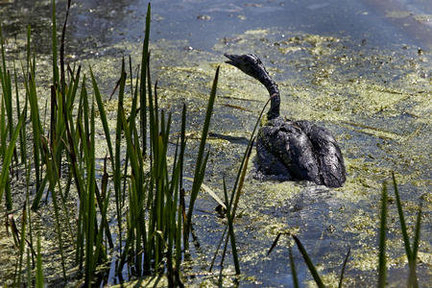Enbridge: Trust us to be safe

With so much at stake, one might imagine the state of Michigan would lock in ironclad safety and oversight protections before it agreed to an oil pipeline across the Straits of Mackinac.
But about the closest the 1953 easement Enbridge received from the state comes is a provision on pages 3 and 4 that Enbridge “shall exercise the due care of a reasonably prudent person for the safety and welfare of all persons and public and private property.”
The lease gives the state no right to see safety or inspection reports. And for the most part, that information resides today exclusively with Canada-based Enbridge Energy.
When Enbridge says the pipeline is safe, the state pretty much has to take its word for it.
More coverage: Oil and water: Searching for truth on the Mackinac pipeline
In a June 2014 letter to state Attorney General Bill Schuette and Dan Wyant, director of the Michigan Department of Environmental Quality, Enbridge responded to their query about pipeline inspections:
Question: Does Enbridge notify any government agency of its inspections and report the results of the inspections to the agency? If so, please explain and document such notifications and reports.
Response: There is no requirement to do so, so Enbridge does not notify any regulatory agency of its inspections nor the results of those inspections.
And by and large, that's how it works in the nation's 2.5-million-mile network of oil and gas pipelines. The pipeline grid is nominally overseen by an obscure federal agency, the Pipeline and Hazardous Materials Safety Administration. But with just 110 inspectors on staff in 2010, PHMSA leaves nearly all pipeline inspection to the industry.
Carl Weimer, executive director of the Pipeline Safety Trust, a nonprofit public charity that promotes pipeline safety, said PHMSA's relationship with the industry can be cozy – to the point that the agency has adopted many regulations written by the oil and gas industry. A federal judge endowed the trust with $4 million in 2003, part of a settlement against a company ruled at fault in a 1999 Washington state gasoline pipeline explosion that killed three.
Weimer compared the regulatory relationship between PHMSA and industry to the “fox designing the hen house.”
Under PHMSA regulations, Enbridge is required to inspect the straits segment of its pipeline every five years. Enbridge officials point out they elected on their own to tighten that to every two years.
But Weimer notes that the results of inspections, both by divers and remote cameras, and interior inspections by robotic devices known as “smart pigs,” remain the property of Enbridge.
“That data doesn't go anywhere,” he said.
In its report on the 2010 Enbridge rupture in Marshall – spilling more than 800,000 gallons of tar sands crude into the Kalamazoo River system – the National Transportation Safety Board found lax oversight by PHMSA partly to blame.
“Contributing to the accident was (PHMSA) weak regulation for assessing and repairing crack indications, as well as PHMSA’s ineffective oversight of pipeline integrity management programs, control center procedures, and public awareness,” it stated.
As concerns mounted among environmental groups in recent years about the safety of the Enbridge pipeline in the Straits of Mackinac, Enbridge did share some information with the Michigan Petroleum Task Force – a multi-agency state government group formed in June 2014 to assess the risk of that pipeline.
According to DEQ spokesman Brad Wurfel, Enbridge shared “substantial and varied kinds of data, multimedia stuff, reports, lots of data sets, all accessed through a portal because it was the only way to reasonably – or securely – share a volumes of information, much of which was sensitive.”
But Wurfel indicated that some of that data is technically complex – with no one at DEQ qualified to properly interpret it.
“So yes, one issue here is that we need some third-party expertise to help interpret and evaluate some of the data we received,” he said.
Wurfel did not say when that might happen.
Given the potential consequences of a leak at the straits, Enbridge spokesman Jason Manshum said the firm has every incentive to ensure a rupture never occurs.
“The safety and operational reliability of our pipelines is the very foundation of our business...Zero incidents is and will continue to be the number one goal,” he said.
See what new members are saying about why they donated to Bridge Michigan:
- “In order for this information to be accurate and unbiased it must be underwritten by its readers, not by special interests.” - Larry S.
- “Not many other media sources report on the topics Bridge does.” - Susan B.
- “Your journalism is outstanding and rare these days.” - Mark S.
If you want to ensure the future of nonpartisan, nonprofit Michigan journalism, please become a member today. You, too, will be asked why you donated and maybe we'll feature your quote next time!
 A 2010 rupture in an Enbridge pipeline on the Kalamazoo River near Marshall caused the nation's largest inland oil spill. (Photo courtesy MLive)
A 2010 rupture in an Enbridge pipeline on the Kalamazoo River near Marshall caused the nation's largest inland oil spill. (Photo courtesy MLive)